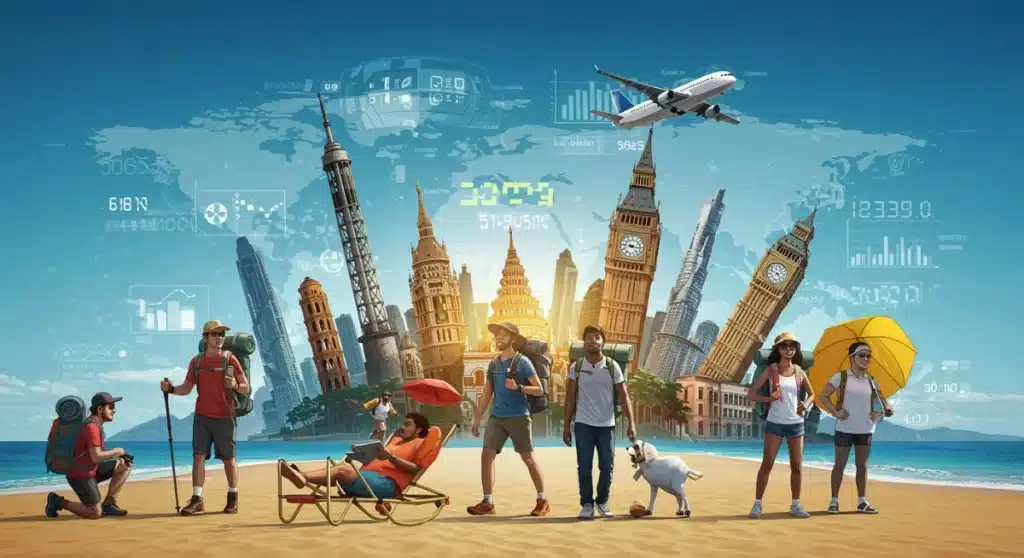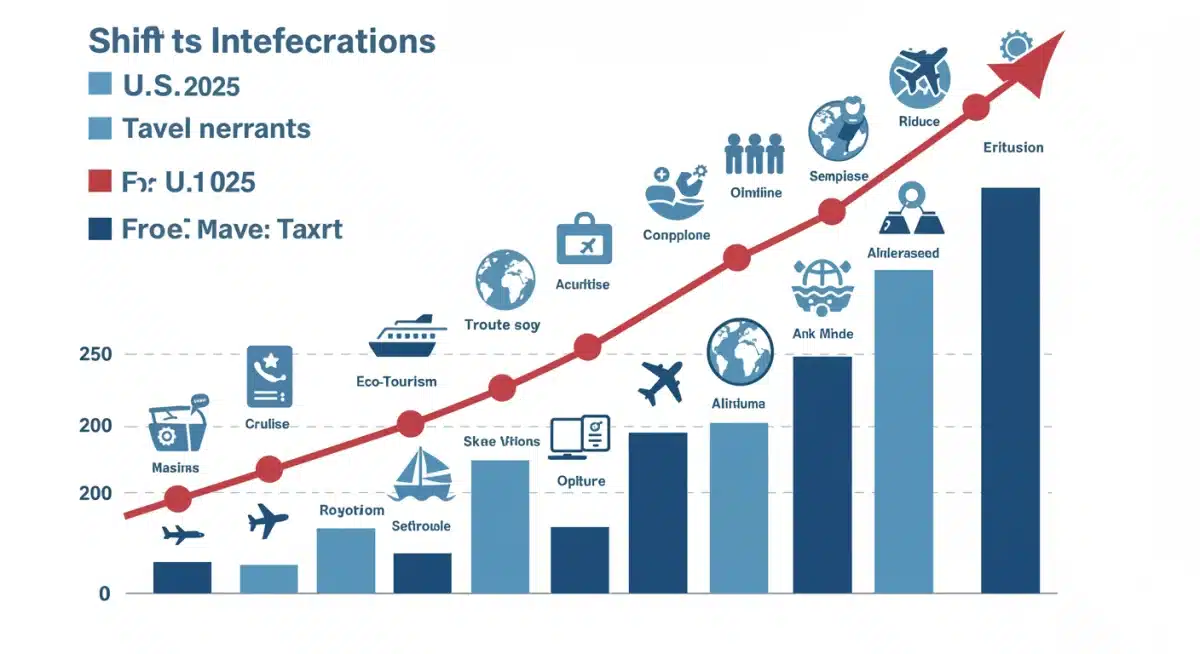2025 Travel Market Outlook: Key Trends Shaping U.S. Consumer Spending

The 2025 Travel Market Outlook reveals a dynamic landscape where U.S. consumer spending prioritizes experiential travel, sustainability, and value, significantly influencing destination choices and industry innovation.
As the travel industry looks ahead, the 2025 Travel Market Outlook: Key Trends Shaping U.S. Consumer Spending and Destination Choices is rapidly taking shape. What can travelers and industry stakeholders expect from the evolving landscape of tourism? Recent developments underscore a significant shift in how Americans plan, book, and experience their journeys.
Economic Pressures and Shifting Priorities for U.S. Travelers
The U.S. travel market in 2025 is grappling with persistent economic pressures, influencing how consumers allocate their discretionary spending. Inflationary concerns and interest rate fluctuations are leading many to re-evaluate their travel budgets, prioritizing value and essential experiences over lavish expenditures.
Despite these economic headwinds, the desire to travel remains robust. Consumers are simply becoming more strategic, seeking out deals, booking further in advance, and exploring alternative destinations that offer similar experiences at a lower cost. This strategic approach is driving a competitive environment among travel providers.
The Rise of Value-Conscious Travel
Value is no longer solely about the lowest price but encompasses the overall experience relative to cost. Travelers are looking for inclusive packages, loyalty program benefits, and destinations that provide a rich cultural or natural experience without breaking the bank.
- All-inclusive resorts seeing renewed interest.
- Increased demand for budget-friendly European destinations.
- Growth in domestic road trips to save on airfare.
Impact of Disposable Income on Destination Choices
Disposable income levels directly correlate with the type and frequency of travel. As economic uncertainties persist, consumers with lower disposable income may opt for shorter trips, closer-to-home destinations, or less expensive accommodation options. Conversely, those with higher disposable income may continue to seek premium experiences but will still demand clear value propositions.
Sustainability and Ethical Travel Gaining Traction
A growing segment of U.S. travelers is increasingly concerned about the environmental and social impact of their journeys. This awareness is translating into demand for more sustainable and ethical travel options, influencing destination choices and the services preferred.
Travelers are actively seeking out eco-friendly accommodations, tour operators committed to responsible tourism, and destinations that prioritize conservation and community well-being. This trend is not merely a niche but a significant force shaping the broader market.
Eco-Friendly Accommodation Preferences
Hotels and resorts that implement sustainable practices, such as renewable energy, waste reduction programs, and locally sourced food, are becoming more attractive. Certifications from recognized environmental organizations are also playing a crucial role in consumer decision-making.
Community-Based Tourism Experiences
There’s a rising interest in experiences that directly benefit local communities. This includes staying in locally owned guesthouses, participating in cultural exchanges, and purchasing goods and services from local artisans. Travelers want to feel that their money is making a positive impact.
- Support for indigenous tourism initiatives.
- Preference for authentic cultural immersion.
- Increased bookings with operators committed to fair labor practices.
Technological Innovations Enhancing the Travel Experience
Technology continues to be a pivotal driver in the 2025 travel market. From AI-powered planning tools to seamless digital check-ins, technological advancements are streamlining the travel process and offering more personalized experiences. Mobile applications are becoming indispensable for navigation, translation, and real-time updates.
The integration of virtual and augmented reality is also starting to play a role, allowing travelers to preview destinations and experiences before booking, or even offering immersive entertainment during transit. Data analytics are enabling travel providers to offer highly customized recommendations and deals.
AI and Personalized Travel Planning
Artificial intelligence is transforming how travelers plan their trips. AI-powered platforms can analyze preferences, past travel history, and even social media activity to suggest tailored itineraries, accommodations, and activities. This personalization saves time and enhances satisfaction.
Seamless Digital Journeys
The expectation for a frictionless travel experience is higher than ever. Digital boarding passes, contactless payment options, and smart luggage tracking are just a few examples of how technology is making travel more convenient and less stressful. Biometric screening at airports is also expanding, speeding up security processes.

The adoption of digital wallets and wearable tech for payments and access is simplifying transactions globally. Travelers are increasingly reliant on their smartphones for every step of their journey, from booking to post-trip sharing.
The Enduring Appeal of Experiential Travel
Beyond simply visiting a place, U.S. consumers in 2025 are seeking meaningful and memorable experiences. This trend emphasizes immersive cultural activities, adventure tourism, and opportunities for personal growth and learning. Passive sightseeing is being replaced by active engagement.
The demand for unique, off-the-beaten-path adventures continues to grow. Travelers want stories to tell and skills to acquire, making workshops, volunteer tourism, and specialized tours highly sought after. This shift is pushing providers to innovate their offerings beyond standard packages.
Adventure and Niche Tourism Growth
Activities such as trekking, culinary tours, wildlife safaris, and wellness retreats are experiencing significant growth. Consumers are willing to spend more on experiences that align with their personal interests and offer a sense of accomplishment or discovery.
- Surge in bookings for outdoor adventure trips.
- Increased participation in culinary and wine tours.
- Demand for wellness and spiritual retreats.
Learning and Skill-Based Vacations
Many travelers are using their vacation time to learn new skills or deepen existing hobbies. This could include photography workshops in scenic locations, language immersion programs, or even hands-on conservation projects. Travel is becoming a vehicle for self-improvement.
Remote Work and the Blurring Lines of Business and Leisure
The widespread adoption of remote and hybrid work models has profoundly impacted travel patterns, blurring the traditional lines between business and leisure. The rise of ‘bleisure’ travel and digital nomadism is a significant trend influencing destination choices and length of stays in 2025.
Workers are extending business trips to include personal leisure time, or choosing to work from different locations for extended periods. This flexibility opens up new opportunities for destinations that can cater to both professional and recreational needs, offering reliable internet, co-working spaces, and appealing local attractions.
The ‘Bleisure’ Phenomenon
Combining business travel with leisure activities is becoming standard practice. Employees are adding extra days to their work trips to explore the local area, often bringing family members along. This expands the economic impact of business travel beyond traditional corporate spending.
Digital Nomads and Extended Stays
Destinations that offer long-term stay options, good infrastructure, and a vibrant community are attracting digital nomads. These travelers contribute significantly to local economies through extended stays, renting accommodations, and utilizing local services. Countries and cities are actively competing for this growing demographic.
- Growth of co-living and co-working spaces in popular destinations.
- Visa programs designed for remote workers.
- Increased demand for apartments and villas over traditional hotels for longer stays.
Regional Shifts and Emerging Destination Hotspots
The 2025 travel market is witnessing shifts in popular destination choices, with some traditional hotspots experiencing saturation and new regions emerging as attractive alternatives. This is driven by a combination of factors including affordability, unique cultural offerings, and improved accessibility.
While perennial favorites will always draw crowds, there’s a noticeable diversification in where U.S. consumers choose to go. Secondary cities, less-traveled national parks, and international destinations offering strong value are gaining prominence. This trend helps distribute tourism more evenly and reduces pressure on overcrowded sites.
Diversification Beyond Major Gateways
Travelers are increasingly looking beyond major gateway cities like New York or Paris, opting instead for smaller, culturally rich towns or less-explored regions. This allows for a more authentic experience and often comes with a lower price tag.
Increased Interest in South America and Southeast Asia
Regions like South America and Southeast Asia are experiencing a boost in popularity among U.S. travelers. Their rich cultural heritage, diverse landscapes, and favorable exchange rates make them highly appealing. These destinations offer a blend of adventure, relaxation, and cultural immersion.
Health, Safety, and Flexible Booking Remain Paramount
Lessons learned from recent global events continue to shape traveler priorities. Health and safety protocols, along with flexible booking and cancellation policies, remain critical factors influencing consumer confidence and decision-making in 2025.
Travelers expect clear communication from providers regarding health guidelines, cleanliness standards, and options for modifying or canceling bookings without significant penalties. The peace of mind offered by these assurances can be a deciding factor when choosing between travel options.
Enhanced Health and Hygiene Standards
Hotels, airlines, and tour operators are maintaining and evolving their health and hygiene practices. Visible adherence to strict cleaning protocols and easy access to sanitation facilities are now standard expectations, not just added bonuses.
Importance of Flexible Booking Policies
The ability to change or cancel plans without incurring substantial costs is a major draw. Travel insurance, once an afterthought for many, is now considered an essential component of trip planning, reflecting a proactive approach to potential disruptions.
| Key Trend | Brief Description |
|---|---|
| Value-Conscious Spending | U.S. consumers prioritize value, seeking deals and inclusive packages amidst economic pressures. |
| Sustainable Travel | Increased demand for eco-friendly options and community-based tourism experiences. |
| Technological Integration | AI-powered planning, seamless digital journeys, and personalized experiences are key. |
| Experiential Focus | Travelers seek meaningful, immersive adventures and opportunities for personal growth. |
Frequently Asked Questions About 2025 Travel Trends
Persistent inflation and fluctuating interest rates are leading U.S. consumers to adopt more value-conscious spending habits. This translates into seeking affordable destinations, booking in advance, and prioritizing experiences that offer significant perceived value for their money.
Sustainability is a growing concern, with travelers favoring eco-friendly accommodations, responsible tour operators, and destinations committed to conservation. This trend suggests a conscious shift towards travel that minimizes environmental impact and supports local communities ethically.
Technology is crucial for personalization and efficiency. AI-powered planning tools, seamless digital check-ins, and mobile applications are enhancing the travel experience. Virtual reality previews and advanced data analytics are also becoming more prevalent, offering tailored recommendations.
Absolutely. The demand for meaningful, immersive experiences continues to grow. Travelers seek unique cultural activities, adventure tourism, and opportunities for personal growth. This includes learning-based vacations and active engagement over passive sightseeing, driving innovation in tour offerings.
Remote work is blurring the lines between business and leisure, fostering ‘bleisure’ travel and digital nomadism. This allows for extended stays and diversified destination choices, impacting local economies significantly. Destinations are adapting to cater to both professional and recreational needs of these travelers.
Looking Ahead
The 2025 Travel Market Outlook signals a dynamic period for the U.S. travel sector. As consumer behaviors evolve, the industry must adapt to meet demands for value, sustainability, and personalized experiences. The emphasis on technology and flexible travel options will continue to grow, shaping how destinations and providers compete for traveler attention. Understanding these trends is critical for stakeholders looking to thrive in the coming year, as the market navigates economic shifts and changing priorities.